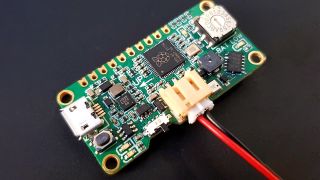RP2040 Launches Rocket Flight Computer
The Pi's the limit

Putting Raspberry Pi boards into space is nothing new, but the method of achieving orbit often differs. While the Astro Pi computers headed for the final frontier onboard a SpaceX Falcon 9 rocket, there are some decidedly lower-tech approaches including, as detailed on the Tindie blog, this $45 RP2040 flight computer from Finnish designer Dan Invents.
Combining the RP2040 controller with an altimeter, accelerometer, temperature sensor, and enough juice to power two servo motors (for parachute deployment on the way down), the Rockit (rocket operation computing kit) weighs just 0.18oz (5g) and measures 1.73 x 0.9 x 0.35 inches (44 x 22 x 9 mm). It comes with an open-source firmware pre-installed, and can be tinkered with and updated over micro USB. There's a 16-position rotary switch for adjusting parameters such as start and end positions for the servos, and also a buzzer, so you can more easily find your rocket after a successful landing.
Compared to the 2MHz Apollo guidance computer that deposited Neil Armstrong on the Moon, the RP2040 is a powerhouse, and should be more than capable of altitude-based parachute opening and logging flight data from the sensors to a micro SD card. The kit, which costs $44.99, comes with just the board and its pin headers - you need to supply your own battery, servos, cabling, micro SD card and space suit.
There's also a note on the page that the device hasn’t been tested in an actual flight, but we’re sure that’s nothing to worry about. The source code, documentation and design files are also available for perusal on GitHub.
Stay On the Cutting Edge: Get the Tom's Hardware Newsletter
Join the experts who read Tom's Hardware for the inside track on enthusiast PC tech news — and have for over 25 years. We'll send breaking news and in-depth reviews of CPUs, GPUs, AI, maker hardware and more straight to your inbox.

Ian Evenden is a UK-based news writer for Tom’s Hardware US. He’ll write about anything, but stories about Raspberry Pi and DIY robots seem to find their way to him.
Most Popular




